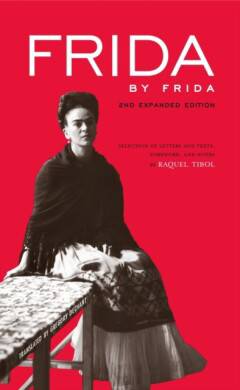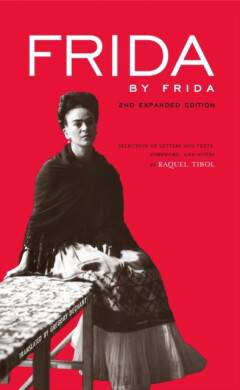
- Afhalen na 1 uur in een winkel met voorraad
- Gratis thuislevering in België vanaf € 30
- Ruim aanbod met 7 miljoen producten
- Afhalen na 1 uur in een winkel met voorraad
- Gratis thuislevering in België vanaf € 30
- Ruim aanbod met 7 miljoen producten
Zoeken
€ 34,95
+ 69 punten
Omschrijving
An appealing book about Frida, by Frida, providing an original, fascinating insight into her life, thoughts, and feelings. Reprinted in hardback with a beautiful new cover.
Frida Kahlo, the writer? Art critic Raquel Tibol gathers letters, poems, notes, protests, confessions, brief messages, and longer texts written by Kahlo to her friends, lovers and others.
In her writings, Kahlo employs, in Tibol's words, an "unreserved, imaginative language, heart and intimacy laid bare," that reveals her taste for neologisms, colloquial turns and the crossing of linguistic boundaries. The freedom of her language is a path towards sincerity, the origin of Kahlo's pictorial universe, with its recurring motifs: the bus accident that left the artist physically maimed at the age of 18; her anguished and demanding adolescent passion for Alejandro Gómez Arias; her complex and fascinating relationship with Diego Rivera; her illness as destiny; her political engagements; and her uncompromising quest for liberty.
Here the reader will find Kahlo "swinging back and forth between sincerity and manipulation, self-complacency and self-flagellation, with her insatiable need for affection, her erotic upheavals, her touches of humor, setting no limits for herself, with a capacity for self-analysis and a deep humility." By gathering this material, until now scattered in archives and various published sources, Tibol offers us "a tacit autobiography and the placement of Frida within the intimate, confessional literature of the twentieth century in Mexico."
This is a Frida Kahlo far removed from the distorted image so often found in films, plays and supposedly serious writings and studies.
Frida Kahlo, the writer? Art critic Raquel Tibol gathers letters, poems, notes, protests, confessions, brief messages, and longer texts written by Kahlo to her friends, lovers and others.
In her writings, Kahlo employs, in Tibol's words, an "unreserved, imaginative language, heart and intimacy laid bare," that reveals her taste for neologisms, colloquial turns and the crossing of linguistic boundaries. The freedom of her language is a path towards sincerity, the origin of Kahlo's pictorial universe, with its recurring motifs: the bus accident that left the artist physically maimed at the age of 18; her anguished and demanding adolescent passion for Alejandro Gómez Arias; her complex and fascinating relationship with Diego Rivera; her illness as destiny; her political engagements; and her uncompromising quest for liberty.
Here the reader will find Kahlo "swinging back and forth between sincerity and manipulation, self-complacency and self-flagellation, with her insatiable need for affection, her erotic upheavals, her touches of humor, setting no limits for herself, with a capacity for self-analysis and a deep humility." By gathering this material, until now scattered in archives and various published sources, Tibol offers us "a tacit autobiography and the placement of Frida within the intimate, confessional literature of the twentieth century in Mexico."
This is a Frida Kahlo far removed from the distorted image so often found in films, plays and supposedly serious writings and studies.
Specificaties
Betrokkenen
- Auteur(s):
- Uitgeverij:
Inhoud
- Aantal bladzijden:
- 399
- Taal:
- Engels
Eigenschappen
- Productcode (EAN):
- 9788419233950
- Verschijningsdatum:
- 30/08/2024
- Uitvoering:
- Hardcover
- Afmetingen:
- 147 mm x 217 mm

Alleen bij Standaard Boekhandel
+ 69 punten op je klantenkaart van Standaard Boekhandel
Beoordelingen
We publiceren alleen reviews die voldoen aan de voorwaarden voor reviews. Bekijk onze voorwaarden voor reviews.











